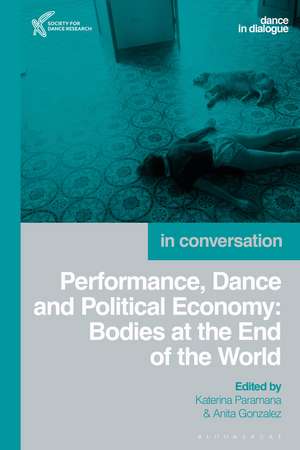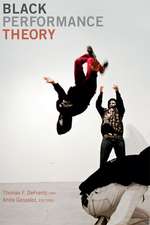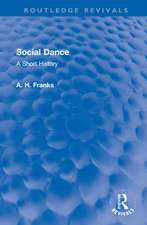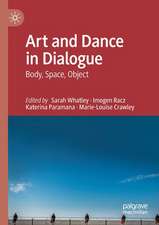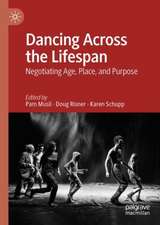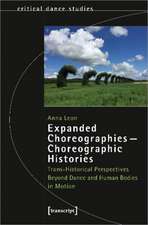Performance, Dance and Political Economy: Bodies at the End of the World: Dance in Dialogue
Editat de Katerina Paramana, Anita Gonzalezen Limba Engleză Paperback – 19 oct 2022
| Toate formatele și edițiile | Preț | Express |
|---|---|---|
| Paperback (1) | 195.10 lei 43-57 zile | |
| Bloomsbury Publishing – 19 oct 2022 | 195.10 lei 43-57 zile | |
| Hardback (1) | 404.04 lei 43-57 zile | |
| Bloomsbury Publishing – 21 apr 2021 | 404.04 lei 43-57 zile |
Preț: 195.10 lei
Preț vechi: 256.43 lei
-24% Nou
Puncte Express: 293
Preț estimativ în valută:
37.33€ • 39.08$ • 30.89£
37.33€ • 39.08$ • 30.89£
Carte tipărită la comandă
Livrare economică 07-21 aprilie
Preluare comenzi: 021 569.72.76
Specificații
ISBN-13: 9781350188754
ISBN-10: 1350188751
Pagini: 208
Dimensiuni: 129 x 198 mm
Greutate: 0.2 kg
Editura: Bloomsbury Publishing
Colecția Bloomsbury Academic
Seria Dance in Dialogue
Locul publicării:London, United Kingdom
ISBN-10: 1350188751
Pagini: 208
Dimensiuni: 129 x 198 mm
Greutate: 0.2 kg
Editura: Bloomsbury Publishing
Colecția Bloomsbury Academic
Seria Dance in Dialogue
Locul publicării:London, United Kingdom
Caracteristici
Different modes of articulation (essays and performative writing responses) offer different kinds of insights into the topics of conversation and make it more accessible to different audiences
Notă biografică
Katerina Paramana is Senior Lecturer (Associate Professor) in Theatre and Performance at Brunel University London, UK. She is co-editor of the book Art and Dance in Dialogue, author of several articles on the socio-political and ethical dimensions of contemporary performance, and co-editor of the Interdisciplinary Book Series Dance in Dialogue. Her performances have been presented internationally. Anita Gonzalez is Professor of Theatre, Chair of Dance and Associate Dean of Faculty Affairs at the University of Michigan, US. Gonzalez is co-editor of the book Black Performance Theory with Thomas DeFrantz and author of Afro-Mexico: Dancing Between Myth and Reality and Jarocho's Soul, as well as of numerous articles and book chapters.
Cuprins
Foreword: A Gesture Tavia Nyong'oOpening Thoughts and Introductions Katerina Paramana and Anita Gonzalez ProvocationsCHAPTER 1:Performance, Dance and Political Economy: A ProvocationKaterina ParamanaCHAPTER 2:Recognizing Race and Class in Dance: Gonzalez Response to ParamanaAnita Gonzalez Dialogue 1: Control of BodiesCHAPTER 3: A World Beyond the Captured Body Nina PowerCHAPTER 4: Choreographing Rage Marc Arthur Dialogue 2: Commodification of Bodies CHAPTER 5: Honesty and the Body Nina PowerCHAPTER 6: Feeling my way through several beginnings Alexandrina Hemsley Dialogue 3: Rest, Productivity, and SurvivalCHAPTER 7: Sleepwalking: Toward A New Corporeality of Dance Marc ArthurCHAPTER 8: It Only Happens In Daylight Jamila Johnson-Small Dialogue 4: Communal DisruptionsCHAPTER 9: Community, Coloniality and Convivencia in the Festival de Danza de Santa María la Antigua del Darién, Colombia Melissa Blanco BorelliCHAPTER 10:Changing Our Bodies' Relationships to RealityUsva Seregina Dialogue 5: Anarchic Inversions of Neoliberal Economies CHAPTER 11: The "End," "Lived Time" or How to Say Goodbye to Your World, A World. Melissa Blanco-BorelliCHAPTER 12: Dance, Anarchism, Mutual Aid Elena Loizidou Dialogue 6: Escaping Capitalism?CHAPTER 13: Breaking the Illusion of Reality: Exploring Reiterations of the Performance of Consumption Usva SereginaCHAPTER 14: From Exchange to Freedom and back. No guarantees. Elena Loizidou Group ConversationCHAPTER 15: In Conversation - Bodies at the End of the World: Performance, Dance and Political EconomyKaterina Paramana, Anita Gonzalez, Nina Power, Marc Arthur, Melissa Blanco Borelli, Usva Seregina, Jamila Johnson-Small, Elena Loizidou, and Alexandrina Hemsley (in the order of speaking)References Index
Recenzii
Anyone encountering Paramana and Gonzalez's volume for the first time will be thrilled to find that finally here comes a book that addresses how our bodies claim back the world by rejecting abuse and commodified relations.
[Performance, Dance and Political Economy] addresses how dance and movement provide a means for our bodies to claim back the world and reject the commodified relations of capitalism ... The collection successfully illuminates the role of dance in thinking about these political questions.
This book is a conversation. Not a record of finished discussions, it is a purposeful provocation toward the engagement of otherwise futures. Taking the form of call and response, sets of essays respond to each other and to art works, weaving an open invitation to concerted participation in collective efforts we must make toward change - change in the global political economy and change in the genre of human delimited by the lifeways of colonial-capitalism. Powerful, insightful, and brave imaginings here welcome, through the prism of performance, the "end of the world" as we have known it. Importantly, the authors in this collection also get on with the business of choreographing elsewise. The call is to rearrange ourselves at the granular level of our bodies in space, our bodies in relation to each other and to the political economies that delimit us. We are asked to extend our limbs like our abilities to theorize, and insist upon our capacities to listen, learn, heal, breathe, bend, love, fly. Kudos to Anita Gonzalez and Katerina Paramana for a book that, with an inspiring Foreword by Tavia Nyong'o and contributions by political and social theorists as well as by performance and dance studies scholars, makes so many contemporary ends into even more future beginnings.
The book excellently captures dance as a semio-technological structure that discursively and corporeally targets the accelerated system of necrocapitalist economic restrictions, discrimination, and expropriation to incite a genealogy of historical and future transformations - to literally dance against reinvigorated control and rapacious extractive violence.
This new interdisciplinary dialogue opens up fresh perspectives that strike a good balance between theoretical perspectives and responses to these that are grounded in the experiences of artists and others in the field. Gonzalez and Paramana have assembled a team who have a wide range of knowledge and expertise, are all well established but progressive, and offer stimulating contributions.
[Performance, Dance and Political Economy] addresses how dance and movement provide a means for our bodies to claim back the world and reject the commodified relations of capitalism ... The collection successfully illuminates the role of dance in thinking about these political questions.
This book is a conversation. Not a record of finished discussions, it is a purposeful provocation toward the engagement of otherwise futures. Taking the form of call and response, sets of essays respond to each other and to art works, weaving an open invitation to concerted participation in collective efforts we must make toward change - change in the global political economy and change in the genre of human delimited by the lifeways of colonial-capitalism. Powerful, insightful, and brave imaginings here welcome, through the prism of performance, the "end of the world" as we have known it. Importantly, the authors in this collection also get on with the business of choreographing elsewise. The call is to rearrange ourselves at the granular level of our bodies in space, our bodies in relation to each other and to the political economies that delimit us. We are asked to extend our limbs like our abilities to theorize, and insist upon our capacities to listen, learn, heal, breathe, bend, love, fly. Kudos to Anita Gonzalez and Katerina Paramana for a book that, with an inspiring Foreword by Tavia Nyong'o and contributions by political and social theorists as well as by performance and dance studies scholars, makes so many contemporary ends into even more future beginnings.
The book excellently captures dance as a semio-technological structure that discursively and corporeally targets the accelerated system of necrocapitalist economic restrictions, discrimination, and expropriation to incite a genealogy of historical and future transformations - to literally dance against reinvigorated control and rapacious extractive violence.
This new interdisciplinary dialogue opens up fresh perspectives that strike a good balance between theoretical perspectives and responses to these that are grounded in the experiences of artists and others in the field. Gonzalez and Paramana have assembled a team who have a wide range of knowledge and expertise, are all well established but progressive, and offer stimulating contributions.
